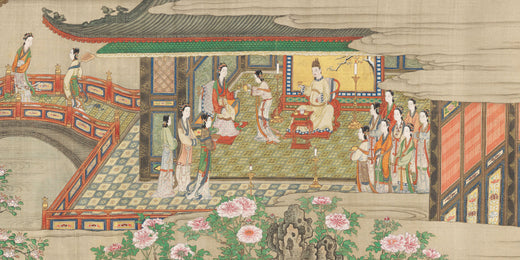
Emperor Xuanzong and Lady Yang (Part 1)
Ching Hsiao, Evan Mantyk, Contributing Editor
Lady Yang, one of China's Four Great Beauties, shares a love story with the renowned Tang emperor Xuanzong. The story has echoed through the ages. In Tang poet Bai Juyi's "Song of Everlasting Sorrow," the two lovers vow to be together like the mythical lovebirds, yearning for eternal union. But, like a Shakespearean tragedy, the story ends in death and longing, as Bai Juyi writes, “This endless sorrow knows no end.” And yet, also as in the great epics of the West, the grand pageant of history marches forward to a more beautiful place thanks to their enriching lives.
But what exactly happened between her and Emperor Xuanzong?
Lady Yang, also known as Yang Guifei and originally named Yang Yuhuan, married the Prince of Shou, named Li Mao, in the twenty-fourth year of Emperor Xuanzong’s reign. This raised her status from a seventh-rank official's daughter to a princess related to the Emperor himself. The Prince of Shou was the son of Emperor Xuanzong and Concubine Wu. However, their marriage lasted only five years before she passed away and Emperor Xuanzong, Li Mao's father, took a liking to his son's wife.
In ancient China, a father-in-law marrying his son’s wife was considered scandalous. Emperor Xuanzong, as a wise ruler, surely understood ethical norms, so why did he pursue his son's wife? To understand this, we need to consider the historical context. Not long before the Tang Dynasty, the land of China experienced a period of ethnic mingling and conflict during the Northern and Southern Dynasties. Consequently, the Tang Dynasty was significantly influenced by the customs of ethnic minorities, and Emperor Li Yuan, the founder of the Tang Dynasty, had nomadic Mongolian ancestry. Northern minority cultures did not necessarily reject the practice of a father-in-law marrying his son's wife.
Additionally, Emperor Xuanzong was deeply affected by the sudden death of his beloved Concubine Wu, leading to excessive grief. By the end of the twenty-sixth year of his reign, Emperor Xuanzong had established a flourishing era and desired tranquility after achieving cultural and military success. In this state, his heart, once frozen, became susceptible to vulnerability and loneliness after losing his companion. Emperor Xuanzong's hope was not for a beautiful woman chosen from among the three thousand beauties of the harem, but for a life and spiritual companion who shared his thoughts and feelings. After Concubine Wu's death, Xuanzong remained despondent for three years until Yang Yuhuan, like a gentle breeze, entered his long-frozen heart.
Under the pretext of praying for blessings for Xuanzong’s mother, Yang Yuhuan became a Taoist nun, adopting the name "Tai Zhen." Later on, she resumed secular life and thereafter Xuanzong ennobled her as a concubine. Thus, cultural, psychological, and historical factors contributed to the marital bond between Emperor Xuanzong and Lady Yang.
The poet Li Bai wrote the timeless "Quiet and Peaceful Melody" for Lady Yang, immortalizing her enchanting beauty and inspiring character. In another piece Li Bai also wrote, “The most beautiful flower in the land, enjoying the king's smile,” certainly referring to Lady Yang. This reflected Emperor Xuanzong's deep affection for Lady Yang.
Interestingly, like ordinary couples, they also quarreled and reconciled.
In the first case, Lady Yang was expelled from the Imperial Palace. One historical record states, "The concubine's jealousy and unruliness angered the Emperor, who ordered her to be sent to her brother's residence. That day, the Emperor was uneasy, had not eaten by midday, and became irritable, lashing out at his attendants. Gao Lishi sought to gauge the Emperor's intentions and suggested sending Lady Yang back to the palace with more than a hundred carriages laden with supplies, and the Emperor himself sent her imperial meals. In the evening, Gao Lishi submitted a memorial requesting the Guifei's return to the palace, and they opened the sealed gates to let her in. From then on, her favor rose, and the harem was unable to approach."
It can be seen that Lady Yang’s attitude was insolent at the time, and Emperor Xuanzong, in a fit of anger, ordered her to return to her brother's home. However, shortly after Lady Yang left, Emperor Xuanzong began to miss her. He couldn't even think about tea and rice, and when his attendants didn't comply with his wishes, he became angry and even lost his temper with them. Fortunately, Gao Lishi understood the Emperor's intentions. Under his advice, Lady Yang was brought back that same night. After that, Emperor Xuanzong's affection for her deepened.
History also leaves us a record of a second expulsion: “Lady Yang again disobeyed the Emperor's wishes.” She stopped listening to the Emperor. Xuanzong did not immediately bring Lady Yang back as before. However, Ji Wen (one of Xuanzong’s favorite officials) stepped forward and used a ruse to indirectly remind Emperor Xuanzong not to forget that family disputes should be resolved within the family. No matter how big the conflict was, Lady Yang was still his family. So Lady Yang returned to the palace again, and the couple reconciled once more. The historical record states, "The Emperor hastily sent Gao Lishi to call her back, and her favor deepened." From “her favor deepened,” we can see that the conflicts between Emperor Xuanzong and Lady Yang enhanced the depth of their relationship.
In the Chinese opera "The Long Life Pavilion," Emperor Xuanzong and Lady Yang pledged to each other on the Qiqiao Festival and exchanged vows to the heavens, with Emperor Xuanzong giving her a gold hairpin symbolizing their unwavering love. This golden hairpin, symbolizing their vows of love, would later become symbolic of the life-and-death struggle of the An Lushan Rebellion, which we’ll discuss next.

























